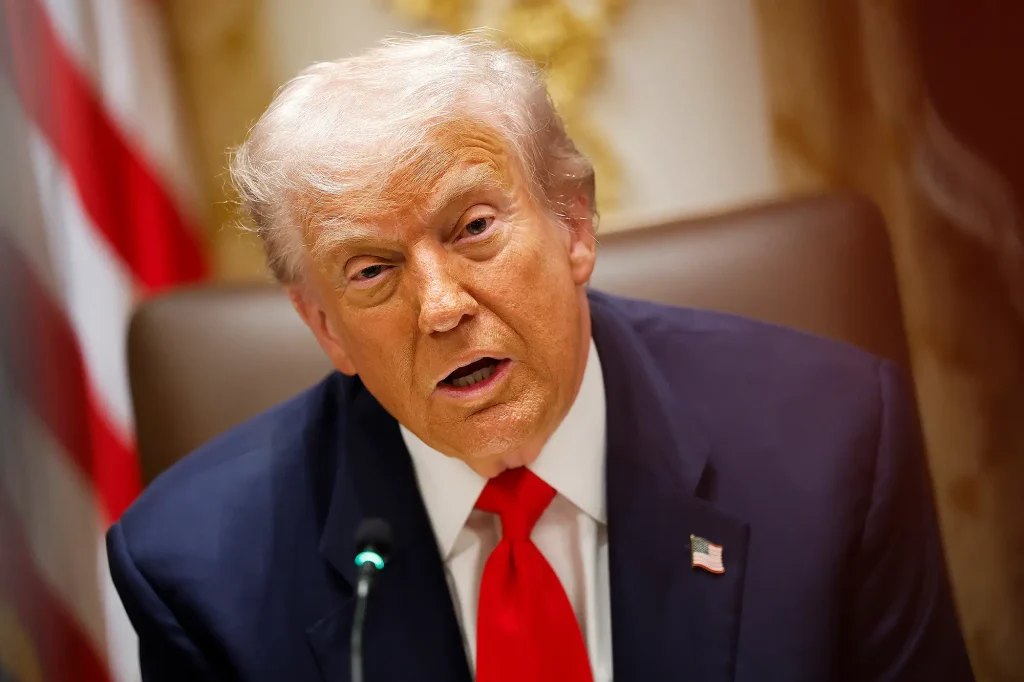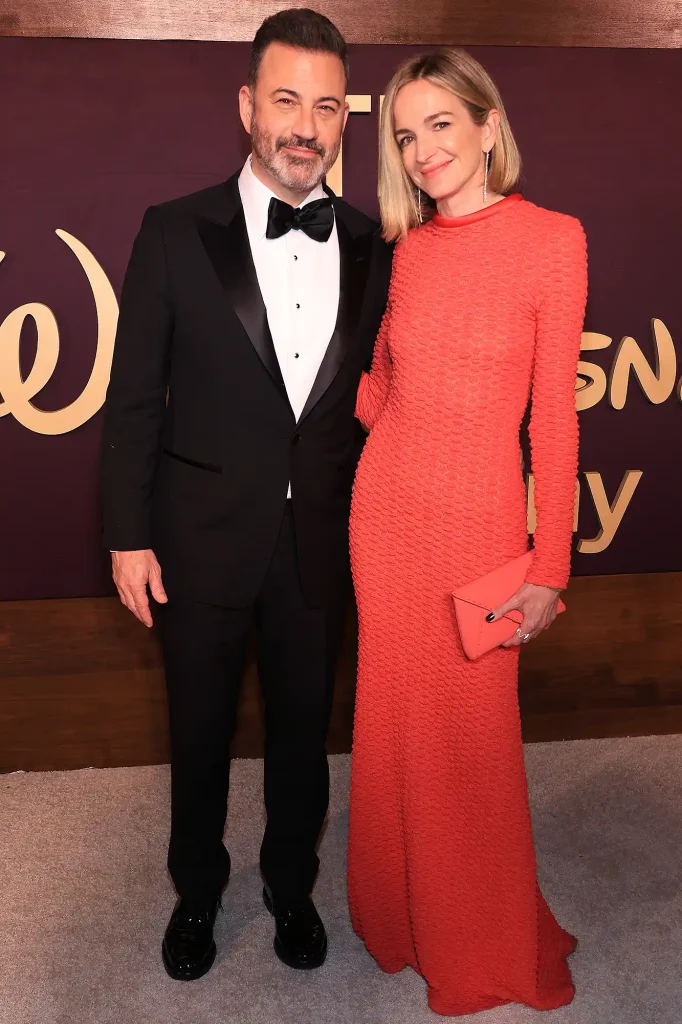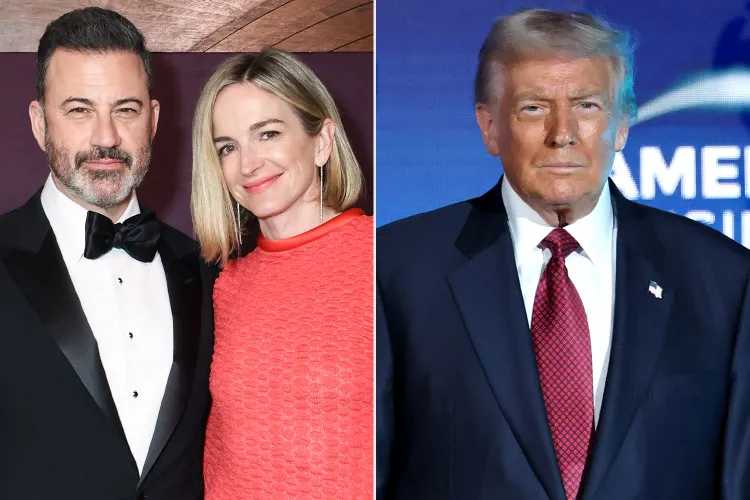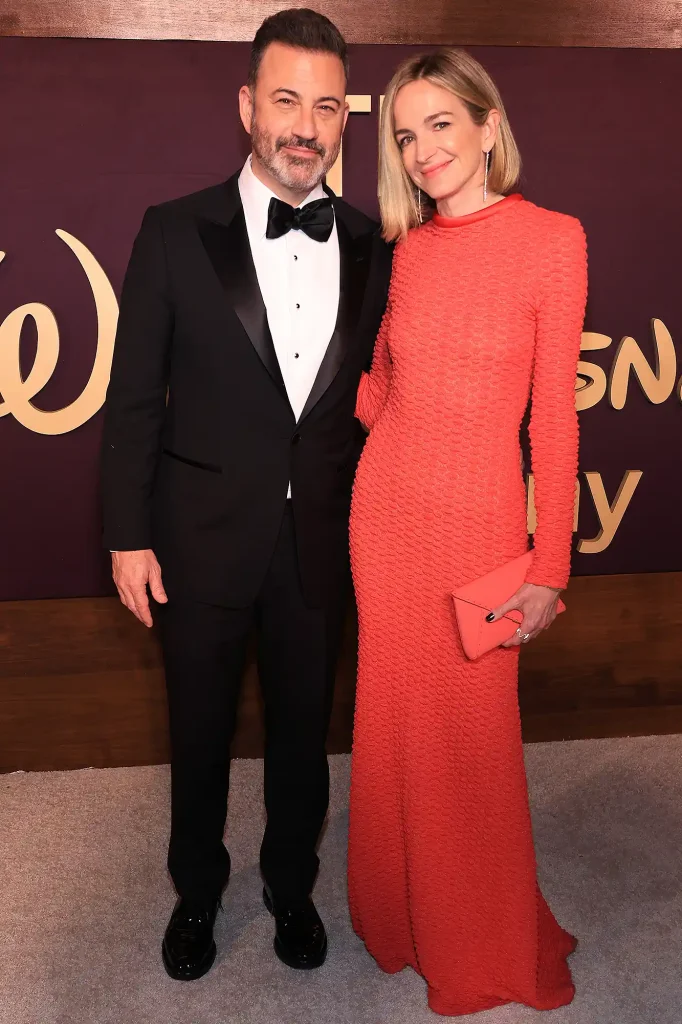Molly McNearney Says Family Ties Are Breaking as Jimmy Kimmel’s Anti-Trump Battles Cast a Shadow at Home
In a candid and emotional conversation on the We Can Do Hard Things podcast, Molly McNearney — the executive producer and co-head writer of Jimmy Kimmel Live! — opened up about how her husband Jimmy Kimmel’s public feud with former president Donald Trump has deeply strained her relationships with relatives who still support him. The 47-year-old producer revealed that while politics has always been a sensitive topic in families, the divide within hers has reached a point where some relationships are no longer repairable. What began as ideological disagreements has evolved into what she calls a “values clash,” leaving her torn between love for family and loyalty to her principles.

McNearney, who was raised in what she describes as a “very conservative Republican household” in St. Louis, said that her upbringing taught her traditional values of faith, service, and compassion. But as she moved away, began her career in entertainment, and started a family with Kimmel, her worldview changed. “I grew up in a Republican household,” she said. “But when I went out into the world, met people from different backgrounds, and started learning more about policies and empathy, I changed.” That evolution didn’t sit well with everyone in her family — particularly those who remained loyal to Trump — and the tension only escalated as her husband became one of Trump’s most outspoken critics on late-night television.
For years, Jimmy Kimmel has used his platform to take sharp, comedic aim at Trump’s presidency, policies, and controversies. While his humor is often grounded in satire, it’s also become increasingly pointed, especially during election seasons. McNearney acknowledged that his public stance, though rooted in conviction, has put her in a difficult position at home. “It hurts me so much because of the personal relationship I now have, where my husband is out there fighting this man [Trump], and to me, them voting for Trump is them not voting for my husband and me and our family,” she said. “And unfortunately I have kind of lost relationships with people in my family because of it.”

Her words reflect a growing divide familiar to many families across the country — one where political identity has started to overshadow shared history and affection. McNearney explained that while she tries to stay connected with loved ones who hold opposing beliefs, she struggles when those beliefs directly contradict her core values. “To me, this isn’t politics. It’s truly values,” she said, emphasizing that her disagreement with Trump-supporting relatives isn’t about party loyalty but about compassion, truth, and morality.
She revealed that ahead of past elections, she even sent heartfelt emails to relatives, pleading with them to reconsider. “I’ve sent many emails to family, like right before the election saying, ‘I’m begging you. Here are 10 reasons not to vote for this guy. Please don’t,’” she recalled. “And I either got ignored by 90% of them or got truly insane responses from a few. It’s definitely caused a strain.” The silence and resistance she encountered deepened her sense of loss, and over time, she began to accept that some relationships might never fully recover.
McNearney’s comments also shed light on the emotional toll this ongoing divide has taken. “I feel angry all the time,” she admitted, referring to how daily news coverage reignites frustration. “When I see these terrible stories, I’m immediately mad at certain aunts, uncles, cousins who put him [Trump] in power. And it’s really hard.” Her honesty underscores the exhaustion of carrying that kind of emotional weight — loving people whose beliefs feel incompatible with one’s own.
Despite her frustration, McNearney doesn’t come across as bitter; rather, she speaks with sadness and empathy. She expressed sympathy for relatives who, in her view, have been “misled” by misinformation. “There’s a little bit of sympathy I have for people in my family that I feel are kind of being deliberately misinformed every day, and they believe it,” she said. Her remarks strike a delicate balance — anger at the outcome, compassion for the people caught in the cycle.

McNearney’s perspective also carries the complexity of being married to a celebrity whose public persona is tied to political commentary. For Kimmel, humor has always been both his weapon and his shield. His critiques of Trump — from monologues about COVID-19 misinformation to jokes about political scandals — have won him both praise and backlash. But for McNearney, those moments don’t end when the cameras stop rolling. The public fight, she said, “follows us home.” In private, she’s the one managing the ripple effects — the text messages, the awkward family gatherings, the silence from people she once spoke to every week.
Still, she maintains that her marriage is built on unity and understanding. “Jimmy’s job is to make people think, to make them laugh, to tell the truth,” she said. “That’s who he is, and I love him for it.” The couple, who married in 2013 and share two children, have always presented a united front. McNearney made clear that her loyalty to her husband doesn’t just come from love — it comes from believing in what he stands for. “When you see the world differently from people you love, it breaks your heart,” she admitted. “But you can’t unsee what you see. You can’t unknow what you know.”
The issue, McNearney explained, isn’t limited to her own family — it’s emblematic of what’s happening across the country. She described the experience of seeing entire families divided by political beliefs, noting that social media and misinformation have amplified the divide. “It feels like people are being told stories that keep them angry and afraid,” she said. “And when they live in that cycle, it’s hard to break through with truth or empathy.” Her reflections mirror what many families are experiencing in today’s polarized climate, where the dinner table can feel like a battleground.
Despite her pain, McNearney said she’s learned to find peace in focusing on the relationships that still bring joy. “I’ve definitely pulled in closer with the family that I feel more aligned with,” she said. “And I hate that this has happened. It feels silly. You know, part of me goes, ‘Don’t let politics get in the way.’ But to me, this isn’t politics. It’s truly values. And we just were not aligned anymore.” Her statement illustrates both grief and acceptance — the acknowledgment that some distances can’t be bridged, and that maintaining one’s peace sometimes requires letting go.
The story is about more than just one family. It reflects the reality of thousands of households torn between affection and ideology, where faith, tradition, and political loyalty collide in ways that test even the closest bonds. McNearney’s story resonates because she doesn’t speak like a Hollywood producer — she speaks like someone’s daughter, sister, and cousin trying to hold on to love in a time when disagreement feels like betrayal. Her words are raw, relatable, and painfully human.
In the end, McNearney didn’t offer easy answers or a perfect resolution. She admitted she still feels heartache for the relationships she’s lost but also clarity about the ones she’s kept. For her, the foundation of connection now lies not in shared bloodlines but in shared beliefs — kindness, empathy, and honesty. “At the end of the day,” she said softly, “we have to be able to look at the people we love and say, ‘We tried.’ Even if it means saying goodbye.”


